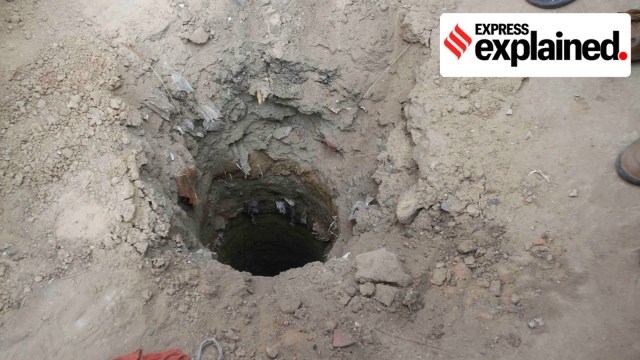Karnataka’s new law to prevent borewell deaths: what it says, why it is needed
The law introduces stringent penalties for improperly closing borewells
 An open borewell in Ahmedabad in which a three-year old child fell down. (Express photo by Javed Raja)
An open borewell in Ahmedabad in which a three-year old child fell down. (Express photo by Javed Raja)The Karnataka Groundwater (Regulation and Control of Development and Management) (Amendment) Bill, passed in the state Assembly on Monday (December 16), brings in stringent measures to prevent open borewell-related accidents and deaths.
Here is why the law was needed, and what it says.
What are open borewells?
Borewells are narrow shafts drilled into the ground to access underground water resources. They were introduced in India in the 1970s, amidst increasing water scarcity.
According to data from the National Disaster Response Force (NDRF) from 2019, there are some 27 million borewells in India. Many of these, however, are abandoned as water is no longer available at the location in which they were dug. Such abandoned borewells are hazardous, as the PVC pipes are taken out and the cover is removed, leaving a gaping hole in the ground.
These “open” borewells are called “death holes” — the chances of survival if one falls into such a borewell is very low, and rescue operations can take hours.
What is the incidence of borewell accidents in Karnataka and the rest of the country?
Incidents of people, especially children falling inside these death holes have been reported across India, including in most parts of Karnataka.
According to the NDRF, from 2009 to 2019, more than 40 children fell into the borewells — 70% of the conventional child rescue operations failed. Haryana, Tamil Nadu, and Gujarat reported the highest incidence of borewell accidents (17.6% each), while 8.8% of incidents were reported from Karnataka.
Apart from having a high probability of failure, rescue operations are also very expensive costing between Rs 50 lakh and Rs 1 crore.
What is the new Karnataka law to prevent borewell accidents?
While passing the Bill on Monday, Minister for Minor Irrigation N S Boseraju said that it is aimed at ensuring proper borewell sealing across the state. According to the new law, improper sealing of abandoned borewells will invite penalties of Rs 25,000 as well as a one-year jail term.
The drilling agency must erect a signboard at the time of drilling or repairs, displaying the complete address of the drilling agency, the implementing agency, or the owner of the land. Moreover, barbed wire fencing or other suitable barriers must be erected around the borewell to avoid entry of unconnected persons or children.
The drilling agency must also submit a declaration to the nearest Grama Panchayat or village administrative officer in case of rural areas, and Junior Engineer (Works), working under the respective Municipal Commissioner or Chief Officer of the Jurisdictional Urban Local Body.
Immediately after the completion of drilling, the drilling agency should cap the borewell either using a steel cap with bolts and nuts, or with a threaded cap as a safety measure to prevent fatal accidents. Failed, abandoned, or incomplete drilled borewells should be filled with locally resourced stones and slurry, with a 2×2 feet mound built above the ground which should be fenced with barbed wire or locally available thorny plants.
The drilling agency has to safely close a failed, abandoned or incompletely drilled borewell within 24 hours, and shall inform the authorities concerned immediately about the action taken in this regard along with photographs of the closed borewell. Authorities concerned have to, after an inspection, issue a certificate stating that the borewell is properly closed.
- 01
- 02
- 03
- 04
- 05






































